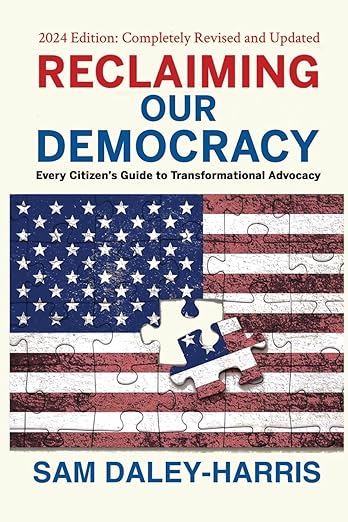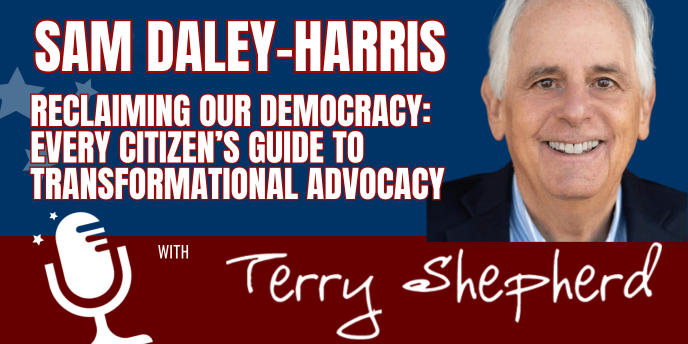Hear the Conversation | Get the Book

There is a distinctly American paradox that Sam Daley-Harris cannot stop hearing. It rises from the bleachers at Little League fields and the sidelines of youth sports, parents who would stride down the steps to dispute a strike zone or lobby for their child’s minutes on the field. Yet those same voices fall quiet at the mention of a congressional office.
One arena feels tribal and proximate, as Sam likes to say, the other distant and hermetic. Who am I in that matter? That’s the question that hovers over the silence, animating his life’s work. His answer, elaborated across decades and now in an updated edition of his book, “Reclaiming Our Democracy: Every Citizen’s Guide to Transformational Advocacy,” is infuriatingly simple and stubbornly unfashionable: you have more agency than you think… if you’re willing to practice it.
Sam came to politics by way of percussion. A young musician with the Miami Philharmonic, he trained in the art of keeping time for others, of binding disparate instruments into a coherent whole. The metaphor is obvious and irresistible. Today he conducts volunteers, local chapters, Hill staffers, toward a common crescendo. When he first published “Reclaiming Our Democracy,” in 1993, he believed a kind of civic musicianship could be taught. The new edition arrives, three decades on, with a wry shrug. “You could say this edition is a 30th-anniversary edition,” he tells me. The subtext is less wry. The charts are still on the stand, the band, to his ear, has yet to find the groove.
The chief dissonance is cynicism. Sam refuses to treat it as sophistication. He quotes a Stanford professor’s poker parable: cynicism is folding your hand before the game begins. In the civic version, you fold before Congress is sworn in, before a bill is even introduced. He sees the country trapped in a national slumber party, every so often we stir at a headline and murmur about how big, how intractable, the world’s problems are. And then we roll over, head back to binging on our favorite streaming series, perhaps post a meme about an issue, and let it go at that.
The book reads like an alarm set to chime, not with outrage, but with assignments.
His own alarm went off in increments. Sam speaks of a “story of self,” borrowing a framework favored by organizer and Harvard professor Marshall Ganz. What are the moments that compel an ordinary person into public work? For him, there were early shocks, the death of a friend near his high-school graduation, the assassinations of the late nineteen-sixties, above all Robert Kennedy. As Sam approached college commencement, that opened a crack in the shell of habit.
The revelation, though, arrived in 1977, at a presentation on ending world hunger. Sam attended more as skeptic than seeker. He walked in assuming inevitability: if hunger could be solved, surely someone would have solved it. He walked out with a different diagnosis. The tools, clean water systems, basic health care, agricultural training, were not mysteries. The obstacle was human nature. Then he made the pivot that has kept him at this for nearly fifty years. There is, he decided, at least one human nature he could influence, his own.
He began in classrooms, guest-lecturing seven thousand high-school students on hunger and its remedies. He brought along a test of the country’s civic pulse. President Carter’s Commission on World Hunger had called for “political will.” So, Sam asked, simply, “What is the name of your member of Congress?” Fewer than three percent could answer. You cannot will what you cannot name.
That silence became his project. From it, he built RESULTS, an anti-poverty citizens’ lobby, and later a coaching outfit, Civic Courage, designed to teach the thing Americans are forever told they possess but rarely practice: how to use their voice.
The pedagogy rests on a distinction between the transactional and the transformational. Transactional advocacy is the frictionless world of the pre-written e-mail and the one-click petition, activism varnished to the gloss of consumption. It is not that these gestures are useless; it is that they are insufficient and easily mistaken for power.
Transformational advocacy asks for more and therefore gives more. It insists on chapters instead of atomized followers. It involves training in the concrete arts, how to request and hold a meeting with an elected official, how to ask for a specific action, how to write an op-ed that will actually run. The mark of such an organization, in Sam’s formulation, is whether it seeks to grow a list or to “feed you power.”
He tells me a story about a national group, famous and well-funded, that refused to let volunteers write letters to the editor, lest they “get it wrong and misrepresent the organization.” The logo, in other words, outranked the members.
He contrasts that with Citizens’ Climate Lobby, which he helped coach, whose volunteers in 2019 placed more than forty-three hundred letters, op-eds, and editorials. The question was never “Can we trust the members?” but “What must we teach so they get it right?” The result was less perfect messaging and more public voice.
If there is a diagram at the heart of the book, it is the chestnut of two circles: a small one labeled “comfort zone,” and a larger ring around it, “where the magic happens.”
Sam is unembarrassed to use it, because he selling craft, not catharsis. And the craft begins, counterintuitively, with listening. He coaches advocates to meet opposition without the performative certainty that social media rewards.
Ask three questions, he says, and actually wait for the answers. We know you don’t support this bill; what would it take to change your mind? Could you say more about that? Why do you think that is? The aim is not conversion on contact but the discovery of assignments, doable tasks that make the next meeting less theoretical.
He likes to tell of a volunteer who spent three years on a Republican congressman, trying to recruit him to co-chair a bipartisan climate caucus. The lawmaker’s conditions were practical and local: bring in the state chambers of commerce, bring in the mayors. The volunteer did. The caucus followed.
This is not thrilling work in the way campaigns are thrilling. It does not climax on Election Night. It is a politics of accrual and patience, of gains so gradual they are easy to miss. Sam points to one number that has kept him at his desk. In 1984, when RESULTS began pressing for child survival, UNICEF estimated that roughly forty thousand children a day died of preventable causes. Forty years on, that figure has fallen by two-thirds, to around thirteen thousand.
It is not utopia; it is, in the everyday sense. It is salvation, delivered not by a single heroic policy but by relentless, volunteer-driven insistence that budgets include vaccines, that clinics have clean water, that mothers receive basic care. It rarely makes the front page. It sustains the long haul.
To read Daley-Harris now is to be reminded of the futurist Alex Steffen’s blunt line, “cynicism is obedience”, and then to be offered a way out that feels both humbler and more demanding than the usual exhortations.
The transformation he is selling is internal. Consider Maxine Thomas, who arrived at RESULTS with a “heart for service” and no map for advocacy. She trained; she scheduled her first meetings on Capitol Hill; she walked out “euphoric,” she told him, alive to the scandal of her own agency. It wasn’t the fantasy of sudden influence. It was the steadier feeling that she had joined the crew.
The astronaut Rusty Schweickart once urged us to stop behaving like passengers on Spaceship Earth and start acting like crew. Sam’s book is, among other things, a manual for reporting for duty.
In the end, the bleachers metaphor returns. The distance between the dugout and the district office is not moral, only habitual. One feels intimate because we’ve practiced it. The other feels forbidding because we haven’t. Sam will argue that democracy, like percussion, rewards practice, measured strokes, a reliable tempo, the humility to keep perfecting the part you play so others can come in on time.
The game is underway whether or not we pick up our hand. Reclaiming our democracy begins, Sam Daley-Harris suggests, when we stop folding before the deal, look at our cards, and start to play.

